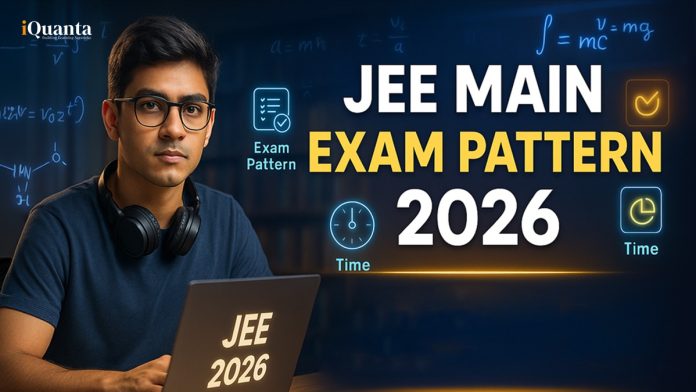JEE Mains 2026 registrations might start in October 2025. Students who have completed or are pursuing the 12th grade with a minimum aggregate score of 75% will be eligible to appear for this entrance exam. The necessary marking criteria for the SC/ST candidates is 65% in the 12th grade examination. Students who are thinking about appearing for JEE 2026 must have a fair understanding about the JEE Mains Exam Pattern 2026. It consists of 3 different examinations,i.e, Paper 1(B.Tech/B.E.), Paper 2A (B.Arch) and Paper 2B (B.Plan). NTA (National Testing Agency) allows the candidates to appear for all these three exams, any one or two which fits their preferences. The JEE Mains Exam Pattern for Session 1 will include 75 questions with total marks as 300.
There will be 77 questions in the Paper 2A (B.Arch) which will constitute 400 marks. Around 100 questions will appear in the Session (B.Plan). The total marks for B.Plan will be 400. In every paper of the JEE Mains 2026, there will be +4 marks for a correct response and -1 for an incorrect response. Students will not get any negative marking for not attempting or leaving questions in Paper 1, Paper 2A and Paper 2B. B.Arch will also have 2 drawing questions in the JEE Mains Exam. You will get 50 marks for each drawing in the exam paper of the Session 2A. Get more information about the JEE Mains Exam Pattern 2026 below. We have also shared the latest information about the eligibility criteria, important dates, beneficial preparation tips, subject-wise weightage, past-paper analysis etc.

Join this free JEE Prep Group to Get Free Study Material, Preparation Strategy by Toppers, Latest Updates and More!
JEE Exam Pattern 2026 (Latest Updates & Preparation Tips)
IIT JEE 2026 shall be conducted in January and April, following the same pattern as previous years. The exam shall be organized by NTA, and the official notification is expected to be released in November 2025. Students currently in Class 12 or those who have already passed it will be eligible to apply. Candidates can choose to appear in one or both sessions, with the best score considered for admission purposes.
The exam pattern for IIT JEE 2026 is expected to remain unchanged, covering topics from Physics, Chemistry, and Mathematics of Classes 11 and 12. The registration process is likely to begin in the first week of October 2025. Students are advised to begin their preparation early and regularly check for the latest updates on IIT JEE 2026 to stay well-informed and exam-ready.
IIT JEE Main Exam Pattern 2026 (Overview)
The IIT JEE Main Exam Pattern 2026 outlines the key elements of the question paper format, enabling the students to plan their preparation efficiently. It provides details such as the exam mode, question types, mark scheme, and other essential aspects. The paper is structured in two sections: Section A features Multiple-Choice Questions, while Section B includes Numerical Value-Type questions.
| Particulars | Paper 1 (B.Tech/B.E.) | Paper 2A (B.Arch) | Paper 2B (B.Plan) |
| Mode of Exam | Computer-based (Online) | Online (Maths & Aptitude) + Offline (Drawing) | Computer-based (Online) |
| Duration | 3 hours | 3 hours | 3 hours |
| Number of Sections | 3 (Physics, Chemistry, Mathematics) | 3 (Mathematics, Aptitude, Drawing) | 3 (Mathematics, Aptitude, Planning) |
| Total Number of Questions | 75 | 77 | 100 |
| Total Marks | 300 | 400 | 400 |
| Type of Questions | MCQs, Numerical Value Questions | Maths: MCQs + NumericalAptitude: MCQsDrawing: Offline | Maths: MCQs + NumericalAptitude & Planning: MCQs |
| Marking Scheme | +4 for correct-1 for incorrect0 for unattempted | +4 for correct-1 for incorrect(Drawing: 50 marks) | +4 for correct-1 for incorrect |
| Languages | 13 languages (English, Hindi & regional languages) | 13 languages | 13 languages |
JEE Main Exam Pattern 2026 & Marking Scheme
| Paper | Subject | Section | Total Questions | Marks per Correct Answer | Marks per Wrong Answer |
| Paper-1 (B.E./B.Tech.) | Physics | Section-A (MCQ) | 20 | 4 | -1 |
| Section-B (Numerical) | 5 | 4 | 0 | ||
| Chemistry | Section-A (MCQ) | 20 | 4 | -1 | |
| Section-B (Numerical) | 5 | 4 | 0 | ||
| Mathematics | Section-A (MCQ) | 20 | 4 | -1 | |
| Section-B (Numerical) | 5 | 4 | 0 | ||
| Paper-2A (B.Arch.) | Mathematics | Part-I (MCQ) | 20 | 4 | -1 |
| Part-I (Numerical) | 5 | 4 | 0 | ||
| Aptitude Test | Part-II (MCQ) | 50 | 4 | -1 | |
| Drawing Test | Part-III (Drawing) | 2 | As per drawing | 0 | |
| Paper-2B (B.Planning) | Mathematics | Part-I (MCQ) | 20 | 4 | -1 |
| Part-I (Numerical) | 10 | 4 | 0 | ||
| Aptitude Test | Part-II (MCQ) | 50 | 4 | -1 | |
| Planning Test | Part-III (MCQ) | 25 | 4 | -1 |
JEE Main Exam Pattern for Paper 1 (B.E./ B.Tech)
| Particulars | Details |
| Exam Name | JEE Main Paper 1 (B.E./B.Tech) |
| Conducting Body | National Testing Agency (NTA) |
| Mode of Exam | Computer-Based Test (CBT) |
| Duration | 3 hours (180 minutes) |
| Total Subjects | Physics, Chemistry, Mathematics |
| Type of Questions | Objective Type (MCQs) and Numerical Value Questions |
| Total Questions | 90 (30 questions per subject) |
| Questions to be Attempted | 75 (25 questions per subject) Section A: 20 MCQs (All Compulsory) Section B: 10 Numerical Questions (Attempt any 5) |
| Total Marks | 300 Marks |
| Marking Scheme | +4 for every correct answer -1 for every incorrect MCQ No negative marking for numerical value questions (Section B) |
| Medium of Exam | English, Hindi, Gujarati, Assamese, Bengali, Kannada, Malayalam, Marathi, Odia, Punjabi, Tamil, Telugu, Urdu |
| Level of Exam | National Level |
| Frequency | Conducted twice a year (Session 1 & Session 2) |
JEE Main Exam Pattern for Paper 2 (B.Arch/ B.Plan)
| Particulars | B.Arch (Paper 2A) | B.Plan (Paper 2B) |
| Exam Name | JEE Main Paper 2A | JEE Main Paper 2B |
| Conducting Body | National Testing Agency (NTA) | National Testing Agency (NTA) |
| Mode of Exam | Computer-Based Test (CBT) | Computer-Based Test (CBT) |
| Duration | 3 hours (180 minutes) | 3 hours (180 minutes) |
| Subjects | Mathematics, Aptitude Test, Drawing Test | Mathematics, Aptitude Test, Planning-Based Questions |
| Total Questions | 77 Questions | 100 Questions |
| Questions to be Attempted | All | All |
| Type of Questions | – Mathematics: MCQs & Numerical Value Questions – Aptitude: MCQs – Drawing: 2 Questions (on drawing sheet) | – Mathematics: MCQs & Numerical Value Questions – Aptitude: MCQs – Planning: MCQs |
| Total Marks | 400 Marks | 400 Marks |
| Marking Scheme | +4 for every correct answer -1 for every incorrect MCQ – No negative marking for numerical value questions | +4 for every correct answer -1 for every incorrect MCQ No negative marking for numerical value questions |
| Medium of Exam | English, Hindi, and other regional languages | English, Hindi, and other regional languages |
| Frequency of Exam | Twice a year (Session 1 & Session 2) | Twice a year (Session 1 & Session 2) |
IIT JEE Main 2026 Exam Dates
The National Testing Agency (NTA) published the official IIT JEE Main 2026 exam schedule on its website, jeemain.nta.ac.in, where candidates can find all important dates, including registration, admit card release, exam dates, result declaration and more.
IIT JEE Main 2026 Exam Dates
| Event | Tentative Date |
| IIT JEE Main 2026 Registration Start Date | October 2025 |
| Last Date To Apply Online | December 2025 |
| Admit Card Release Date | 3 Days Before The Exam |
| Session 1 Exam Date | January 2026 |
| Session 2 Exam Date | April 2026 |
| Result Announcement | A Week After Each Session |
IIT JEE Main 2026 Eligibility Criteria
| Eligibility Criteria | Details |
| Qualifying Exam | Completed Class 12 or equivalent from a recognized board/university or a 3-year diploma recognized by AICTE. |
| Nationality | Indian citizens, NRIs, PIOs, and OCIs are eligible. |
| Age Limit | No specific age limit. Candidates who completed Class 12 in 2024/2025 or are appearing in 2026 are eligible. |
| Number of Attempts | Applicants can attempt IIT JEE Main twice (January and April 2026 sessions). |
| Marks Requirement (General) | Minimum 75% in Class 12 or top 20 percentile in their respective boards. |
| Marks Requirement (Reserved) | Minimum 65% in Class 12 for SC/ST/PwD categories. |
| Subject Requirements | BTech (Paper 1): Physics, Mathematics, and one additional subject (Chemistry/Biology/Technical Vocational subject). |
| BArch (Paper 2A): Physics, Chemistry, and Mathematics. | |
| BPlan (Paper 2B): Mathematics. |
IIT JEE 2026 Preparation Tips for Main and Advanced Exams
| Preparation Tip | Details |
| Focus on NCERT First | Especially useful for Chemistry, NCERT books help build a strong conceptual foundation. |
| Follow a Realistic Timetable | Create a daily schedule that fits your pace and allows sufficient time for revision. |
| Understand the Exam Difference | JEE Main emphasizes speed and accuracy, while JEE Advanced tests deeper conceptual clarity and problem-solving skills. |
| Practice with Mock Tests | Attempt mock tests weekly; analyze your mistakes to gradually improve your performance. |
| Stick to Limited Resources | Use only one or two trusted books per subject and revise them thoroughly to avoid confusion. |
| Solve Previous Year Papers | Practicing PYQs helps understand the exam pattern and identify high-weightage topics. |
| Clear Doubts Without Delay | Resolve your doubts quickly with the help of teachers, mentors, or peer groups to avoid gaps in understanding. |
Key Differences Between JEE Main Exam Pattern and JEE Advanced Exam Pattern
| Feature | JEE Main Exam Pattern 2026 | JEE Advanced Exam Pattern 2026 |
| Organizing Body | National Testing Agency (NTA) | One of the IITs (on rotation) |
| Mode of Exam | Computer-Based Test | Computer-Based Test |
| Number of Papers | 1 Paper for B.Tech (Paper 1), Paper 2A & 2B for B.Arch & B.Planning | 2 Papers (Paper 1 & Paper 2) – both compulsory |
| Subjects | Physics, Chemistry, Mathematics | Physics, Chemistry, Mathematics |
| Type of Questions | MCQs + Numerical Value Type | MCQs, Multiple Correct, Integer Type, Matrix Match, Paragraph Based |
| Marking Scheme | +4 for correct and -1 for incorrect | Varies yearly; includes partial and negative marking |
| Total Questions | 90 (75 to attempt) | Varies each year (~108–120 per paper) |
| Duration | 3 Hours | 6 Hours (3 hours per paper) |
| Eligibility | Open to all eligible candidates | Only top 2.5 lakh JEE Main rank holders |
| Difficulty Level | Moderate | High (Conceptual + Analytical) |
JEE Main Exam Pattern (Subject-Wise Weightage)
| Subject | Important Topics | Approximate Weightage |
| Physics | Laws of Motion, Modern Physics, Thermodynamics | 25–30% |
| Chemistry | Organic Chemistry, Chemical Bonding, Environmental Chemistry | 30–35% |
| Mathematics | Calculus, Coordinate Geometry, Algebra | 30–35% |
JEE Main Exam Pattern (Ideal Time Management Strategy)
| Section | Recommended Time | Strategy |
| Mathematics | 60 minutes | Attempt theory-based questions first |
| Physics | 45–50 minutes | Focus on formula-based direct questions |
| Chemistry | 30–40 minutes | Start with inorganic and NCERT topics |
| Review Time | 10–15 minutes | Revisit doubtful or marked questions |
JEE Main Exam Pattern – Previous Year Paper Analysis (2023–2025)
| Year | Difficulty Level | Toughest Subject |
| 2023 | Moderate | Physics |
| 2024 | Moderate to High | Mathematics |
| 2025 | Moderate | Chemistry |
Conclusion: JEE Main Exam Pattern 2026
Understanding the JEE exam pattern is important for any JEE aspirant who is aiming to secure admission in top engineering institutes like NITs, IIITs, and IITs. The JEE Main exam pattern 2026 better follows the structured format of previous years with Paper 1 for B.Tech, Paper 2A for B.Arch and Paper 2B for B.Planning. Each paper comprises a mixing of MCQs and numerical type questions that tests your conceptual clarity and problem solving speed along with accuracy.
It is important to familiarize yourself with the latest JEE Main pattern, including the marking scheme and section-wise weightage. As you can start your preparation strategy more effectively while knowing this. So stay updated with official notifications, practice previous year papers and prepare a study plan accordingly to increase your chances of success. So whether you are preparing for JEE Main Exam or aiming to qualify JEE Advanced, a deep understanding of the JEE exam pattern helps you to achieve a competitive edge.
Click Here to Enroll to JEE 2026 Course!

FAQs: JEE Main Exam Pattern
JEE 2026 will be conducted by IIT Roorkee.
JEE Main 2026 exam is expected to be held in two sessions: January 2026 and April 2026.
Student who have passed their Class 12 exams in 2024 or 2025 or are appearing in 2026 with Physics, Chemistry, and mathematics as subject are eligible to apply for JEE 2026.
The JEE Main exam pattern 2026 includes three subjects which includes Physics, Chemistry and Mathematics and the total of 75 questions that means 25 questions from each subject. This paper includes MCQs and numerical value questions and follows a marking scheme of +4 and -1.
No, the JEE exam pattern varies based on the paper. Paper 1 for B.Tech is fully online whereas Paper 2A for B.Arch includes an offline drawing test and Paper 2B for B.Planning includes a planning section. So with this each paper has different question types and total marks.
There are no major changes in the JEE Main exam pattern 2026 as of now. It is expected to follow the same structure as previous years with a combination of MCQs and numerical questions.
In JEE Main paper 1 there are total of 90 questions out of which students must attempt 75 questions that means 25 from each section includes Physics, Chemistry and Mathematics.
The marking scheme for the JEE Main exam includes +4 for the correct answer and -1 for the incorrect MCQs whereas there is no negative marking in case of numerical type questions.
The complexity level for the JEE Advanced exam pattern is slightly complex in comparison to the JEE Main Exam pattern.
Understanding the JEE exam pattern helps you to prioritize your concepts or topics and also helps in managing time better, improving accuracy and speed. It is very important to focus on NCERTs, practicing past year papers and analyzing mock results regularly.
You must start your preparation from today itself for the JEE Mains entrance exam 2026. Toppers state that early preparation is the getaway to achieve 99%ile in this national-level entrance exam which is conducted for admission into IITs and other top government engineering institutes all across India.




